Daily Vocabulary Words: List of Daily Used Words in Leading Indian Newspapers
Hi there. Welcome to this special section @ Wordpandit. Our endeavour here is straightforward: highlighting daily vocabulary words that you would come across in leading newspapers in the country. We have included the following newspapers in our selection:
• The Times of India
• The Economic Times
• Hindustan Times
• Mint
• Indian Express
We are putting in extensive work to develop your vocabulary. All you have to do is be regular with this section and check out this post daily. This is your repository of commonly used words; essentially, we are posting a list of daily used words. Hence, this has significant practical application as it teaches you words that are commonly used in leading publications mentioned above.
Visit the website daily to learn words from leading Indian newspapers.
WORD-1: Perceived
CONTEXT: What is new now is the perceived linkage between developments in Manipur and Mizoram on the one hand, and the ongoing conflict in the western part of Myanmar, especially the Sagaing region, and the Chin and Rakhine states, on the other.
SOURCE: Hindustan times
EXPLANATORY PARAGRAPH: Perceived is like how you think or feel about something when you see or hear it. It’s like if you think a dog is friendly because it wags its tail.
MEANING: Noticed or understood in a particular way (verb, adjective).
PRONUNCIATION: per-seevd
SYNONYMS: Recognized, Noticed, Observed, Understood, Discerned, Detected, Comprehended
USAGE EXAMPLES:
1. She perceived a change in his mood.
2. The problem needs to be perceived correctly to find a solution.
3. His actions were perceived as rude by the audience.
4. The colors in the painting are perceived differently by various viewers.
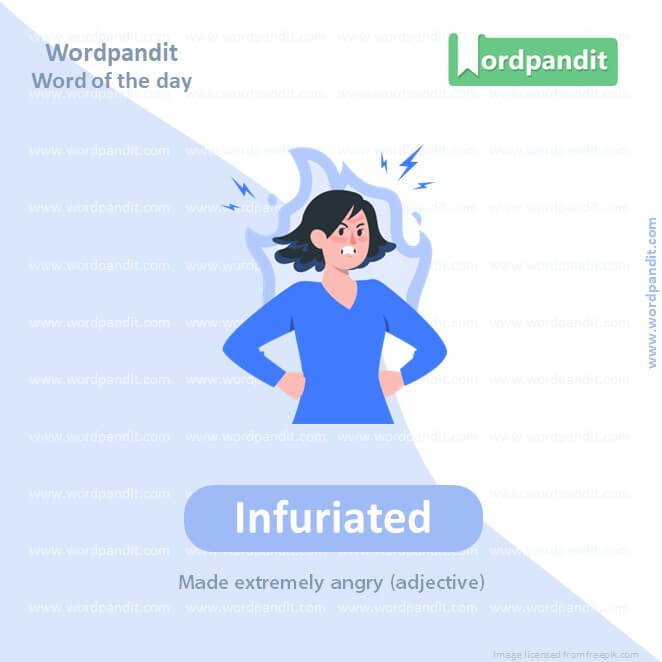
WORD-2: Infuriated
CONTEXT: When Bihar chief minister Lalu Prasad Yadav disallowed his yatra from passing through the state, the kar sevaks were infuriated.
SOURCE: Hindustan times
EXPLANATORY PARAGRAPH: Infuriated is when someone gets really, really angry. Like when someone takes your favorite toy and you feel very mad.
MEANING: Made extremely angry (adjective).
PRONUNCIATION: in-fyoo-ree-ay-tid
SYNONYMS: Enraged, Angered, Incensed, Furious, Outraged, Livid, Exasperated
USAGE EXAMPLES:
1. She was infuriated by the unfair decision.
2. The delay in the flight schedule infuriated the passengers.
3. He became infuriated when he saw the mess.
4. The constant noise from the construction site infuriated the residents.
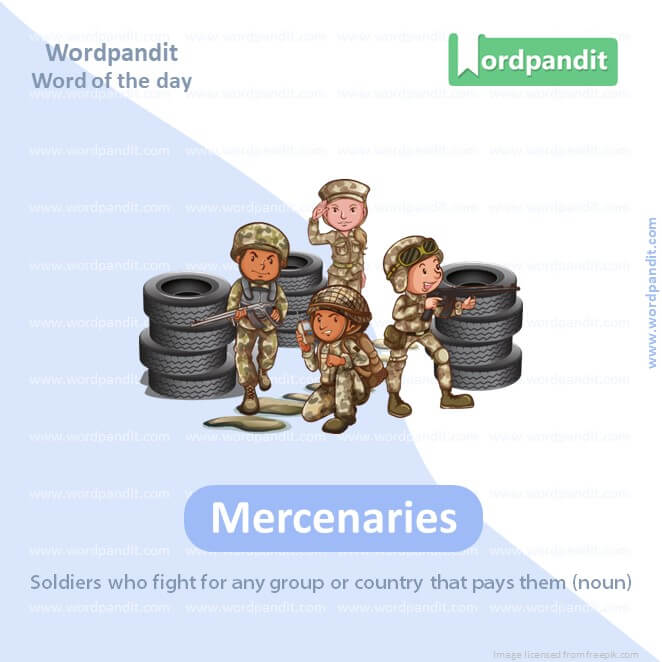
WORD-3: Mercenaries
CONTEXT: A group of mercenaries had arrived in the country by sea and had tried to overthrow the government.
SOURCE: Hindustan times
EXPLANATORY PARAGRAPH: Mercenaries are like soldiers who are paid to fight for someone else, not for their own country. It’s like hiring someone to help you in a battle.
MEANING: Soldiers who fight for any group or country that pays them (noun).
PRONUNCIATION: mur-suh-ner-ees
SYNONYMS: Soldiers of fortune, Hired soldiers, Guns for hire, Contractors, Adventurers, Freelance soldiers, Private soldiers
USAGE EXAMPLES:
1. The mercenaries were hired to protect the convoy.
2. Historical battles often involved mercenaries.
3. The conflict escalated with the involvement of mercenaries.
4. Mercenaries have a reputation for fighting without allegiance to any particular cause.
WORD-4: Intemperate
CONTEXT: The intemperate statements made by some Maldives ministers last week have been condemned by other Maldivian politicians and even the current government
SOURCE: Hindustan times
EXPLANATORY PARAGRAPH: Intemperate is when someone does things too much without control. Like eating too much candy even when it’s not good for you.
MEANING: Lacking moderation or self-control, especially in behavior and expressions (adjective).
PRONUNCIATION: in-tem-puh-rit
SYNONYMS: Excessive, Unrestrained, Uncontrolled, Immoderate, Overindulgent, Unbridled, Extreme
USAGE EXAMPLES:
1. His intemperate speech caused controversy.
2. Intemperate eating can lead to health problems.
3. The celebrity was known for his intemperate lifestyle.
4. Intemperate behavior is often frowned upon in professional settings.
WORD-5: Deniability
CONTEXT: The idea, presumably, is to preserve official deniability but still rattle hostile Maldivian politicians.
SOURCE: Hindustan times
EXPLANATORY PARAGRAPH: Deniability is when someone can say they didn’t do something or didn’t know about it. It’s like saying, “It wasn’t me!” when someone asks who made the mess.
MEANING: The state of being able to deny something, especially responsibility or knowledge of wrongdoing (noun).
PRONUNCIATION: di-ny-uh-bil-i-tee
SYNONYMS: Disavowal, Rejection, Disowning, Refusal, Repudiation, Disclaiming, Nonacknowledgment
USAGE EXAMPLES:
1. The plan was created with plausible deniability in mind.
2. He maintained deniability regarding his involvement in the scandal.
3. The secret operation was structured to ensure deniability.
4. She claimed deniability about the missing funds.
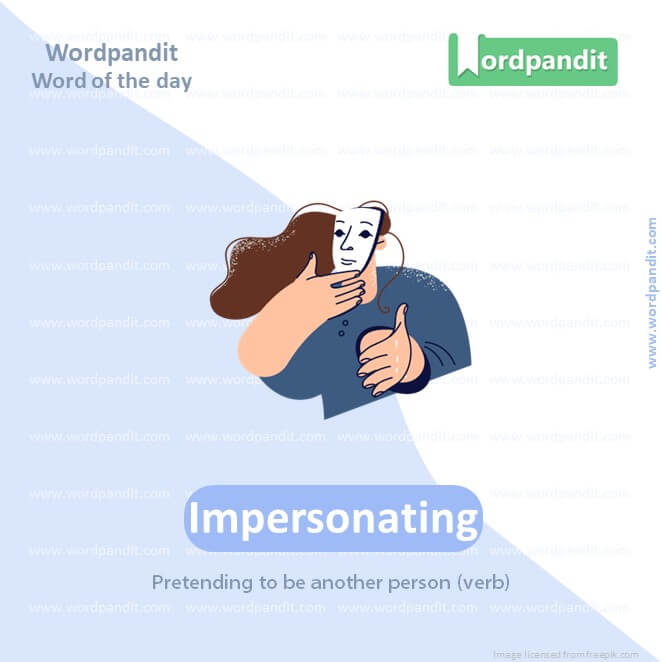
WORD-6: Impersonating
CONTEXT: Social media platforms are also obligated under the IT Rules to take down misinformation and impersonating content
SOURCE: Hindustan times
EXPLANATORY PARAGRAPH: Impersonating is pretending to be someone else. Like when you dress up and act like a famous person for fun.
MEANING: Pretending to be another person (verb).
PRONUNCIATION: im-pur-suh-nay-ting
SYNONYMS: Mimicking, Imitating, Copying, Acting like, Emulating, Posing as, Masquerading as
USAGE EXAMPLES:
1. He was arrested for impersonating a police officer.
2. She enjoys impersonating celebrities in her comedy routine.
3. The movie featured a character impersonating historical figures.
4. Impersonating someone else online can be illegal.
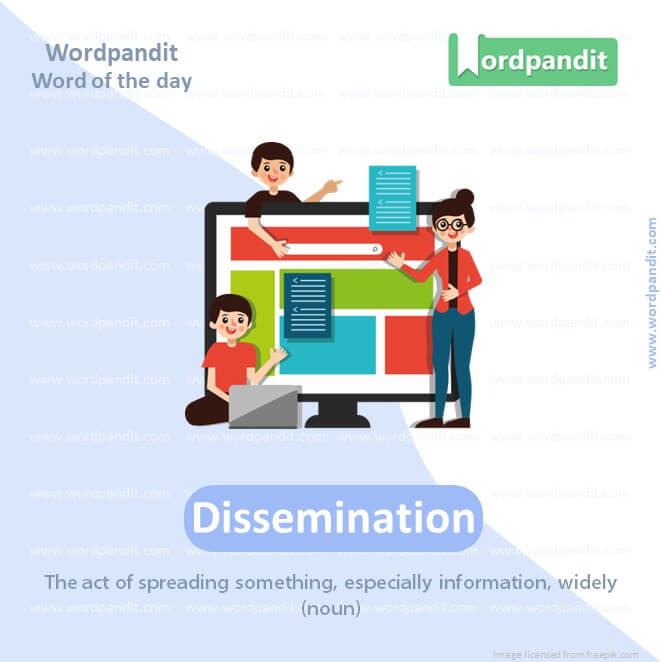
WORD-7: Dissemination
CONTEXT: states like California and Texas have passed laws criminalising the dissemination of deepfake videos influencing elections, while Virginia penalises the distribution of non-consensual deepfake pornography.
SOURCE: Hindustan times
EXPLANATORY PARAGRAPH: Dissemination is like spreading information or knowledge to a lot of people. It’s like when you share a story with all your friends.
MEANING: The act of spreading something, especially information, widely (noun).
PRONUNCIATION: di-sem-uh-nay-shun
SYNONYMS: Spreading, Distribution, Circulation, Broadcast, Diffusion, Propagation, Transmission
USAGE EXAMPLES:
1. The dissemination of false information can be harmful.
2. Social media allows for rapid dissemination of news.
3. The research findings required careful dissemination.
4. Dissemination of knowledge is essential in education.
WORD-8: Demarcated
CONTEXT: the rest of the border has been well delimited and demarcated.
SOURCE: Hindustan times
EXPLANATORY PARAGRAPH: Demarcated is like drawing a line to show where something ends and something else begins. It’s like using a marker to draw boundaries on a map.
MEANING: Clearly set apart or marked off (verb, adjective).
PRONUNCIATION: di-mar-kay-tid
SYNONYMS: Delineated, Marked, Bounded, Defined, Separated, Outlined, Divided
USAGE EXAMPLES:
1. The park area was demarcated with a fence.
2. They demarcated the different zones in the city.
3. The boundaries of the protected area were clearly demarcated.
4. Demarcated walking paths guided the tourists.
WORD-9: Consequential
CONTEXT: As he grapples with the erosion of public trust and consequential dip in his cabinet’s approval ratings, navigating from one crisis to the other.
SOURCE: Hindustan times
EXPLANATORY PARAGRAPH: Consequential means something that is really important or has big effects. It’s like when a small decision changes a lot of things.
MEANING: Having significant or important effects; resulting in serious or large outcomes (adjective).
PRONUNCIATION: kon-suh-kwen-shul
SYNONYMS: Significant, Important, Major, Considerable, Substantial, Weighty, Meaningful
USAGE EXAMPLES:
1. The decision was consequential for the company’s future.
2. He faced consequential choices at the crossroads of his career.
3. The research had consequential findings for the medical field.
4. Her role in the project was consequential to its success.
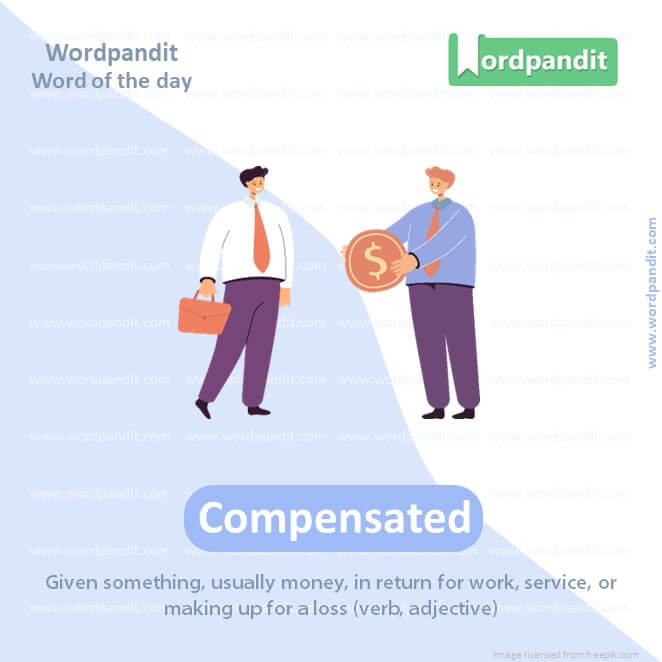
WORD-10: Compensated
CONTEXT.: Informal workers should also be suitably compensated for hazardous air quality and school closure.
SOURCE: Hindustan times
EXPLANATORY PARAGRAPH: Compensated means getting something, like money or a favor, in return for doing something or for a loss. It’s like getting a treat after helping with chores.
MEANING: Given something, usually money, in return for work, service, or making up for a loss (verb, adjective).
PRONUNCIATION: kom-pen-say-tid
SYNONYMS: Reimbursed, Paid, Remunerated, Repaid, Rewarded, Recompensed, Indemnified
USAGE EXAMPLES:
1. The workers were fairly compensated for their overtime.
2. She was compensated for the damage to her car.
3. The company compensated him for his travel expenses.
4. Victims of the accident were compensated by the government.
Vocabulary Meaning
In the ocean of language learning, ‘vocabulary meaning’ is akin to the colorful coral reefs that add depth and vibrancy to communication. Yet, infusing our interactions with this vibrancy is often a challenge for many language learners. The crux lies in effectively deciphering and employing the ‘vocabulary meaning’.
Learning ‘vocabulary meaning’ isn’t about merely gluing words to their definitions. It’s about forming a deep understanding and connection with these words that transcends rote learning. To gain a comprehensive grasp of ‘vocabulary meaning’, one needs to navigate beyond textbook definitions and commit to exploiting diversified resources such as novels, films, music, articles, and digital content. This allows one to encounter vocabulary in a variety of contexts and actual usage, giving deeper insight into their meaning.
However, understanding ‘vocabulary meaning’ involves another essential aspect—memory retention. Techniques such as spaced repetition and the Leitner System offer effective methodologies to maintain and consolidate the ‘vocabulary meaning’. Additionally, leveraging mnemonic strategies can help etch words into your memory by linking them with unique stories or imagery that are personal and easily recallable.
Another way of mastering ‘vocabulary meaning’ is by immersing yourself in the language. Engage in regular conversations with native speakers if possible or utilize language exchange platforms to practice your skills. This not only bolsters your understanding of how the vocabulary is used but also helps articulate the ‘vocabulary meaning’ in the societal and cultural contexts.
In conclusion, gaining a robust grasp of ‘vocabulary meaning’ is a journey rather than an end goal. It requires dedication, perseverance and most importantly, a multi-faceted approach that includes diversified resources, effective memory strategies, and real-life application. With these strategies in place, the depths of ‘vocabulary meaning’ are no longer daunting but become an enchanting exploration of language.













